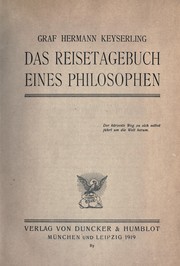
Das Reisetagebuch eines Philosophen
By Hermann von Keyserling
Subjects: Biography, Mormon Church, Mormons, Voyages and travels, Voyages around the world, Description and travel, Philosophers, Travel
Description: Count Hermann Alexander von Keyserling (July 20, 1880 April 26, 1946) was a Baltic German philosopher from the Keyserlingk family. His grandfather Alexander Keyserling was a notable geologist of Imperial Russia. He was born to a wealthy aristocratic family in the Kõnnu Manor, Pärnu County in Governorate of Livonia, Russian Empire, now in Estonia. After his education at the universities of Dorpat (Tartu), Heidelberg, and Vienna, he took a trip around the world. He married Maria Goedela von Bismarck-Schönhausen, granddaughter of Otto von Bismarck. His son Arnold Keyserling followed his father's footsteps and became a renowned philosopher. Hermann Keyserling interested himself in natural science and in philosophy, and before World War I he was known both as a student of geology and as a popular essayist. The Russian Revolution deprived him of his estate in Livonia, and with the remains of his fortune he founded the Gesellschaft für Freie Philosophie (Society for Free Philosophy) at Darmstadt. The mission of this school was to bring about the intellectual reorientation of Germany. He was the first to use the term Führerprinzip. One of Keyserling's central claims was that certain "gifted individuals" were "born to rule" on the basis of Social Darwinism. Although not a doctrinaire pacifist, Keyserling believed that the old German policy of militarism was dead for all time and that Germany's only hope lay in the adoption of international, democratic principles. His best-known work is the Reisetagebuch eines Philosophen ("Travel-journal of a Philosopher"). The book also describes his travels in Asia, America and Southern Europe. He died at Innsbruck, Austria. - Wikipedia.
Comments
You must log in to leave comments.